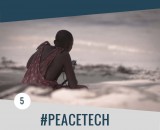Short Stories: Darfur’s Hakamat
In Darfur, in the Western region of Sudan, an influential group of women, known as the Hakamat, are beginning to change their tune. The Hakamat hold a special place in Darfur’s tribal society, serving as voices for war and conflict.
Historically, their songs extoll the masculinity of the men who are willing to take up arms against rival tribes, while decrying those who would attempt to solve their quarrels peacefully. Collaborative for Peace in Sudan (CfPS) seeks the support of these women to break the cycles of violence that have characterized the region. Today, the Hakamat are beginning to sing songs of peace.
According to Raha El Fangry, the co-coordinator of the project, the process has not been easy. CfPS contends with age-old precedents, a culture that celebrates the bravery of warriors, and payment by tribal leaders to sway public opinion.
Yet CfPS’ efforts have not been in vain. The Hakamat women have, little by little, begun to come around to the proposition of singing for peace rather than conflict. This change has come because many Hakamat have paid a personal price for the violence. Raha recalls that one such singer confessed, “I already lost a brother… If I continue singing it could be a son this time round.” It is this sentiment that has convinced so many of these influential women to raise their voices for peaceful resolution to local conflicts.
(Feature photo credit: “Sam Ouandja 3” by Nicolas Rost; CC BY-NC 2.0)

